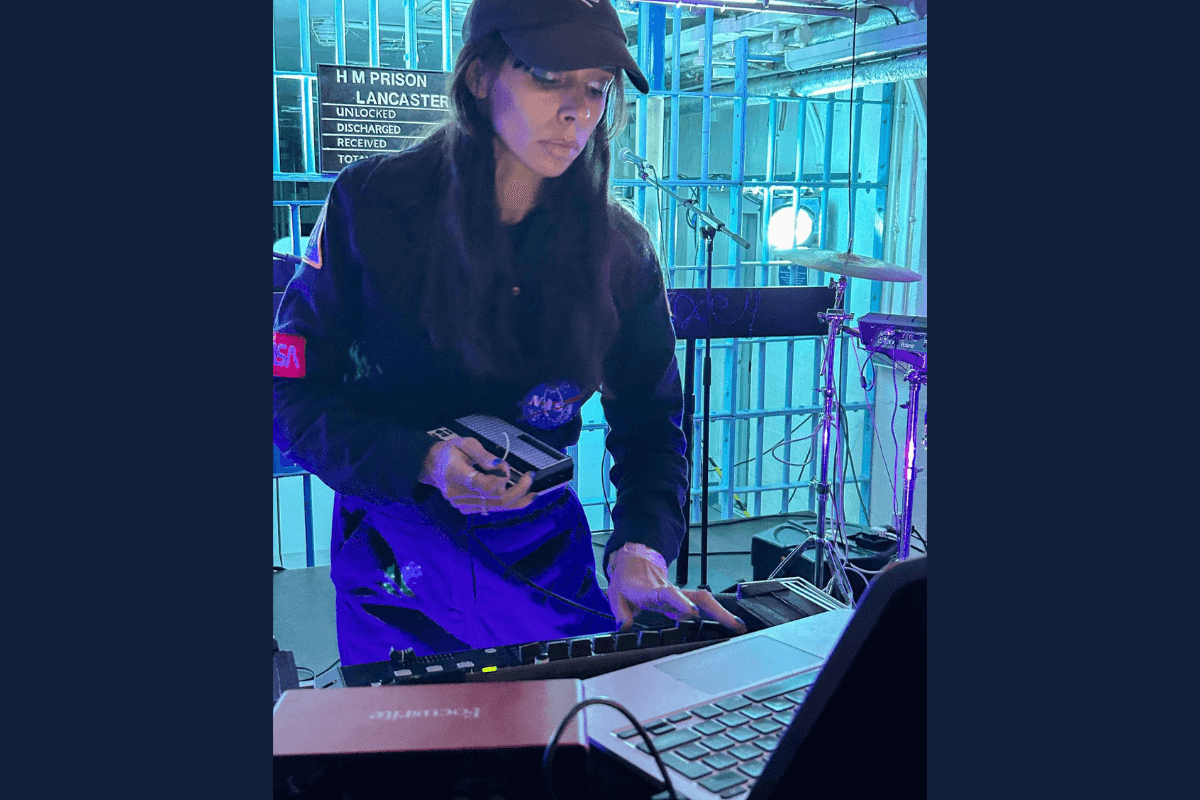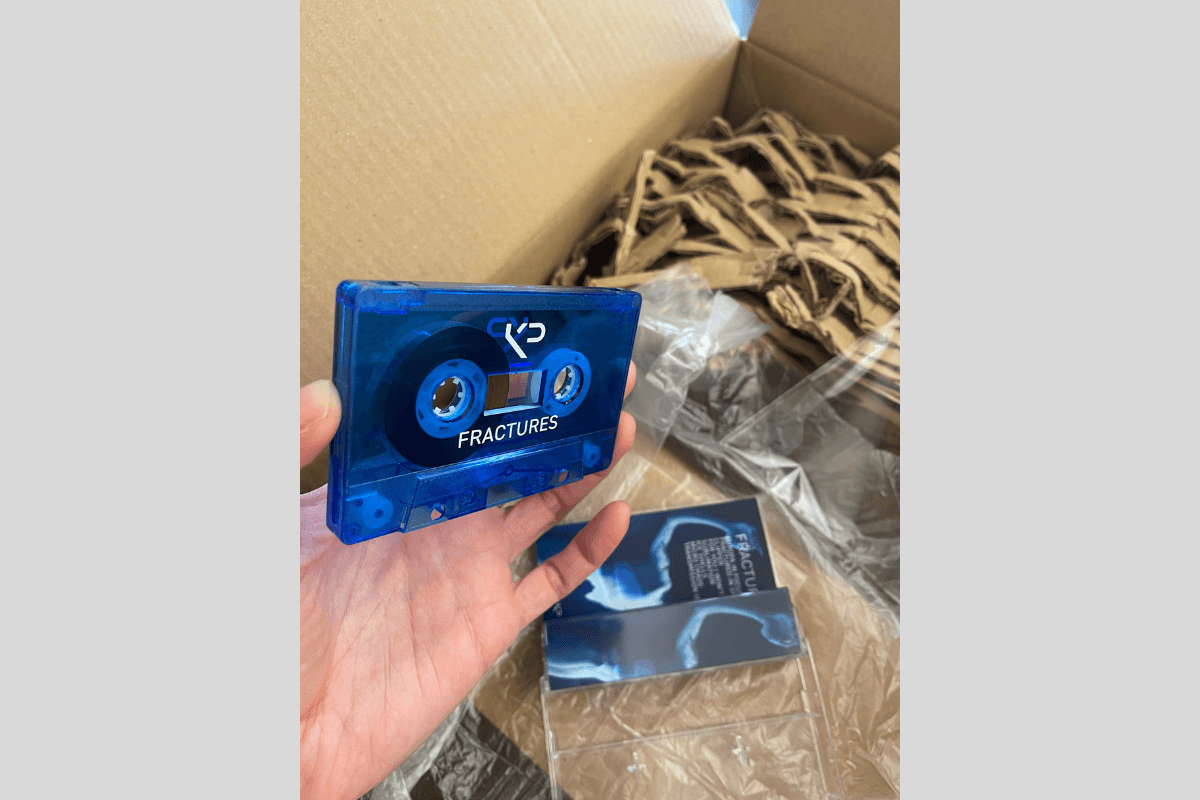I first started out whilst still in University, wanting to release my first EP. I didn’t know how to do that, what it entailed, or even what questions I should be asking. I decided to figure it out as I went along.
I wrote the tracks, went to a venue near my house and hired the small side room as a promoter, not really knowing what a promoter was. I arranged my first ever launch party, invited some other acts to play, liaised with the tech, and sold the tickets. I’m not really sure how, but I managed to sell out the night.
It was an amazing evening and whilst it was so much work, I really enjoyed the rewarding feeling of knowing I had pulled this off, essentially by myself, and the amount I had learnt in the process.
It was all very unofficial, very DIY. On the night, I sold CDs which I'd burned myself on my own CD drive and printed stickers for, using my printer. I didn’t walk away from that night with a bigger fanbase, I didn’t really have a fan base at that point (nor did I know that I should have been thinking about that)! But I did feel a strong sense of determination, reinforced by the success of the night.
Continuing to write, and do the occasional performance, I started on a journey into the music industry, naively not knowing much at all.
Signing an unfair record deal - “the worst decision I've ever made in my career”
I continued to make music, art, and collaborate with people to make music videos, visuals and so on. Eventually one of my music videos, and some of my performances, caught the eye of a record label. It was a medium sized indie label, working with some large international acts, and small UK artists.
I took a punt on signing my publishing to them and agreed to an album deal. It was the worst decision I've ever made in my career. Not only did the publishing company own everything I wrote for 12 years after the release of my first album, but the label refused to release the very album I'd written. I was entirely stuck, and entirely put off writing or performing music, something that had bought me so much joy until I’d signed with them.
Eventually, stuck in a rather shady situation, I paid back my advance and some made up additional ‘admin fee’, and managed to get out of the publishing deal. After years of chasing and speaking with solicitors (and generally becoming so confused as to why a label would behave this way), it transpires I was not the only act to have had this experience.
Rebuilding a career in music, armed with the right support and knowledge
I slowly began to rebuild my creativity, and fall in love with writing music again. It was a lengthy process and I vowed to myself I would never work with another label or publisher again.
However, from speaking to my best friend and long term musical collaborator, Sian Monaghan, I heard about the MU and the Contract Advice Service, a way to navigate those agreements. I wanted to continue to exist in the industry, but I didn’t want to have to turn down every opportunity because I wasn’t able to understand the deals that are sent to musicians. I joined the MU and felt strength in being able to rebuild and start a career in music, armed with support and knowledge.
I went on to work with other labels and publishers, with the confidence of understanding the deals I had signed through the advice of the MU. This enabled me to really build a name for myself, I couldn’t expect to grow as an artist without working with other bodies, collaborate with businesses, and become a successful freelancer in music.
Academically I work as a lecturer, run workshops, write course content, and act as a mentor. Creatively I am releasing music, performing at shows, touring and many more exciting things that come with that side of the job.
 Kayla live at Lancaster Prison.
Kayla live at Lancaster Prison.
In 2024 I self-released my debut album. It took me many years to rebuild my ideas of what my album would be, after it being rejected and representative of such a dire situation. I wondered if I could ever rewrite a debut album I would be pleased with, but I did, and I did not pitch it to any labels.
I knew this release would have to be entirely on my own terms. It would represent my work as a DIY artist and for that reason, it would be a self-release. Years ago, at a show, I met another musician who became a long-term supporter and expressed interest in signing the publishing, which made me feel ready to release it.
What does self-releasing involve?
Self-releasing a record involves so many different tasks requiring different skills, but each time I do it, I learn something new. No two projects are the same, so it’s important to approach them differently. For example a small underground DIY release, that is only going to be released on bandcamp, doesn’t require hours of marketing, pitching to radio and blogs.
With the debut album Fractures, I knew I had to make the biggest commercial impact possible, so I enlisted a radio plugger, got new press shots, and had an amazing time shooting the album cover underwater. Most importantly, I wrote the tracks with a strong narrative and deep meaning, following one of my passions; space exploration.
I wrote the album about a specific NASA mission I had been quietly aware of for some years. It became clear to me this mission was becoming deeply entrenched in the sonic and narrative ideas on the album. Therefore the only time I could possibly envisage launching my debut album, was at the same time that NASA launched the spacecraft Europa Clipper, to look for signs of life on Jupiter’s Frozen moon.
 Kayla explains that handling orders, shipping and fulfillment yourself is a lot to do, but the amount it rewards you is second to none.
Kayla explains that handling orders, shipping and fulfillment yourself is a lot to do, but the amount it rewards you is second to none.
This was the first time I had manufactured vinyl for a release, so allowing for that timeline (especially as it was pressed abroad), was important. Handling all of the orders, shipping and fulfillment myself was a lot to do, on top of managing my own tour, playing the shows, doing my own PR and running a subscription service.
There’s also the administrative side which is really important such as registering your tracks with PRS, PPL, ensuring you are getting paid for the work you have written, and at this point I was also working two jobs to pay the bills.
It is a huge amount of work, but like my first ever self-release and launch party back in the sticky side room of a club that no longer exists, with that eager sold out audience, the amount it rewards you is second to none. The fact you have full creative control over your work and what you do with it (such as choosing the distributor, CD manufacturer, what your artwork looks like, what the tracklisting is, how long the album is), is a huge bonus for me.
My key take away: deals need to be reasonable and I need to be protected
I’m not against working with labels, and I have had good relationships with them and publishers since. However my experience has taught me that, in order to sign with a label, publisher, or collaborate with anyone who could impact my career, I need to fully understand what they are offering and feel that what they provide is something I couldn't achieve on my own.
I have used the MU for advice throughout many of my projects. The amount I have learnt from the representatives, as well as the solicitors, has given me confidence to know more about what I want, and understand my work's value.
The deal has to look reasonable, but I also have to be protected. If a deal doesn’t demonstrate accountability for the other party (e.g. there's no incentive for them to actually do the bare minimum), I won’t sign it.
It often feels disappointing not to sign deals, as being offered one always feels like a huge achievement. However a few months later, while I'm preparing to speak on 6Music about a genre I created—Ambient Owl Core, which I self-released through three EPs and even had published in a book—I never look back and think, 'I wish I'd signed that record deal.'